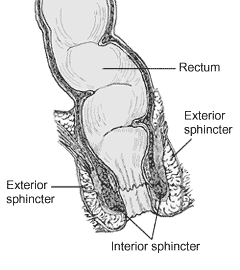Fecal incontinence
| Fecal incontinence | |
|---|---|
 |
|
| Diagram showing normal anatomy of anal canal and rectum. | |
| Classification and external resources | |
| ICD-10 | R15 |
| ICD-9-CM | 787.6 |
| DiseasesDB | 6763 |
| MedlinePlus | 003135 |
| eMedicine | article/268674 |
| MeSH | D005242 |
Fecal incontinence (FI), also called faecal incontinence, bowel incontinence, anal incontinence, accidental bowel leakage, or (in some forms) encopresis, is a lack of control over defecation, leading to involuntary loss of bowel contents—including flatus (gas), liquid stool elements and mucus, or solid feces. FI is a sign or a symptom, not a diagnosis. Incontinence can result from different causes and might occur with either constipation or diarrhea. Continence is maintained by several inter-related factors, and usually there is more than one deficiency of these mechanisms for incontinence to develop. The most common causes are thought to be immediate or delayed damage from childbirth, complications from prior anorectal surgery (especially involving the anal sphincters or hemorrhoidal vascular cushions) and altered bowel habits (e.g., caused by irritable bowel syndrome, Crohn's disease, ulcerative colitis, food intolerance, or constipation with overflow incontinence). An estimated 2.2% of community dwelling adults are affected.
Fecal incontinence has three main consequences: local reactions of the perianal skin and urinary tract, including maceration (softening and whitening of skin due to continuous moisture), urinary tract infections, or decubitus ulcers (pressure sores); a financial expense for individuals (due to cost of medication and incontinence products, and loss of productivity), employers (days off), and medical insurers and society generally (health care costs, unemployment); and an associated decrease in quality of life. There is often reduced self-esteem, shame, humiliation, depression, a need to organize life around easy access to bathroom and avoidance of enjoyable activities. FI is an example of a stigmatized medical condition, which creates barriers to successful management. People may be too embarrassed to seek medical help, and attempt to self-manage the symptom in secrecy from others.
...
Wikipedia
